Time in Japanese // Days, Weeks, Months & Seasons (With FREE Quiz)
Let’s Talk Time in Japanese ⏰ Minutes, Hours, Days, Weeks & More

Today we are going to learn some really useful phrases related to time in Japanese.
We’ll teach you how easy it is to learn the months in Japanese, the different seasons and times of the day, coupled with beautiful flashcards which you are free to download and use yourself!
Remember, you can learn Japanese online with us 24 hours of the day, with Flexi Classes.
Our Japanese courses are becoming more and more popular and we even have a class related to times and dates so you can enhance your knowledge on this topic even further.


Anyway, enough of that, on with the lesson!
Time in Japanese | Minutes & Hours
Time in Japanese | Days of the Week in Japanese
Time in Japanese | Other Vocabulary Related To Days
Time in Japanese | Months in Japanese
Time in Japanese | Seasons in Japanese
BONUS | FREE Quiz
Time in Japanese | FAQ’s

Time in Japanese | Minutes & Hours
Let’s learn a key phrase to start off.
What is the time in Japanese is 今何时ですか (ima nanji desu ka)
Now of course you’ll need to know the numbers in Japanese to tell the time, and we’d assume you know them already?
If not, no fear… check out our complete guide to Japanese numbers.

Japanese Numbers // Your Complete Guide (With Quiz Included)
DO NOT WORRY – learning Japanese numbers is not so difficult. Learning the numbers in Japanese can also open up some unexpected doors.
So to tell them time we simply need to attach 時 (ji) to the number and your job is done!
- 3 o’clock | 三時 (san-ji)
- 7 o’clock | 七時 (shichi-ji)
- 9 o’clock | 九時 (ku-ji)
| English | Kanji | Hiragana | Reading |
|---|---|---|---|
| 1 o’clock | 一時 | いちじ | ichi-ji |
| 2 o’clock | 二時 | にじ | ni-ji |
| 3 o’clock | 三時 | さんじ | san-ji |
| 4 o’clock | 四時 | よじ | yo-ji |
| 5 o’clock | 五時 | ごじ | go-ji |
| 6 o’clock | 六時 | ろくじ | roku-ji |
| 7 o’clock | 七時 | しちじ | shichi-ji |
| 8 o’clock | 八時 | はちじ | hachi-ji |
| 9 o’clock | 九時 | くじ | ku-ji |
| 10 o’clock | 十時 | じゅうじ | jū-ji |
| 11 o’clock | 十一時 | じゅういちじ | jū ichi-ji |
| 12 o’clock | 十二時 | じゅうにじ | jū ni-ji |
Delving further deeper, what if we wanted to talk about the minutes as well as the hours?
分 which is spoken as fun or pun means minute.
Therefore, let’s say we wanted to say the time was 3.50, we would say
3时 50分 (san-ji go-juppun)
| English | Kanji | Hiragana | Reading |
|---|---|---|---|
| 1 minute | 一分 | いっぷん | ippun |
| 2 minutes | 二分 | にふん | ni-fun |
| 3 minutes | 三分 | さんぷん | san-pun |
| 4 minutes | 四分 | よんふん | yon-fun |
| 5 minutes | 五分 | ごふん | go-fun |
| 6 minutes | 六分 | ろっぷん | roppun |
| 7 minutes | 七分 | ななふん | nana-fun |
| 8 minutes | 八分 | はっぷん | happun |
| 9 minutes | 九分 | きゅうふん | kyū-fun |
| 10 minutes | 十分 | じゅっぷん | juppun |
| 20 minutes | 二十分 | にじゅっぷん | ni-juppun |
| 30 minutes | 三十分 | さんじゅっぷん | san-juppun |
| 40 minutes | 四十分 | よんじゅっぷん | yon-juppun |
| 50 minutes | 五十分 | ごじゅっぷん | go-juppun |
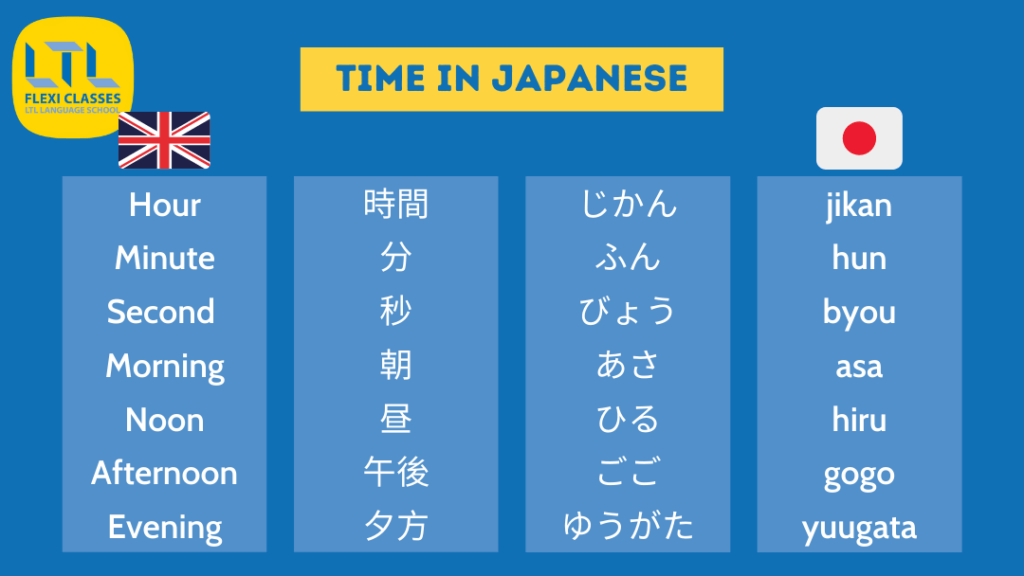
To finish this section, here are some more useful phrases you’ll use regularly when speaking Japanese.
| English | Kanji | Hiragana | Reading |
|---|---|---|---|
| AM | 午前 | ごぜん | gozen |
| PM | 午后 | ごご | gogo |
| morning | 朝 | あさ | asa |
| early morning | 早朝 | そうちょう | sōchō |
| sunrise | 日の出 | ひので | hinode |
| midday | 日中 | にっちゅう | nicchū |
| early evening | 夕方 | ゆうがた | yūgata |
| night | 夜 | よる | yoru |
| midnight | 深夜 | しんや | shin’ya |
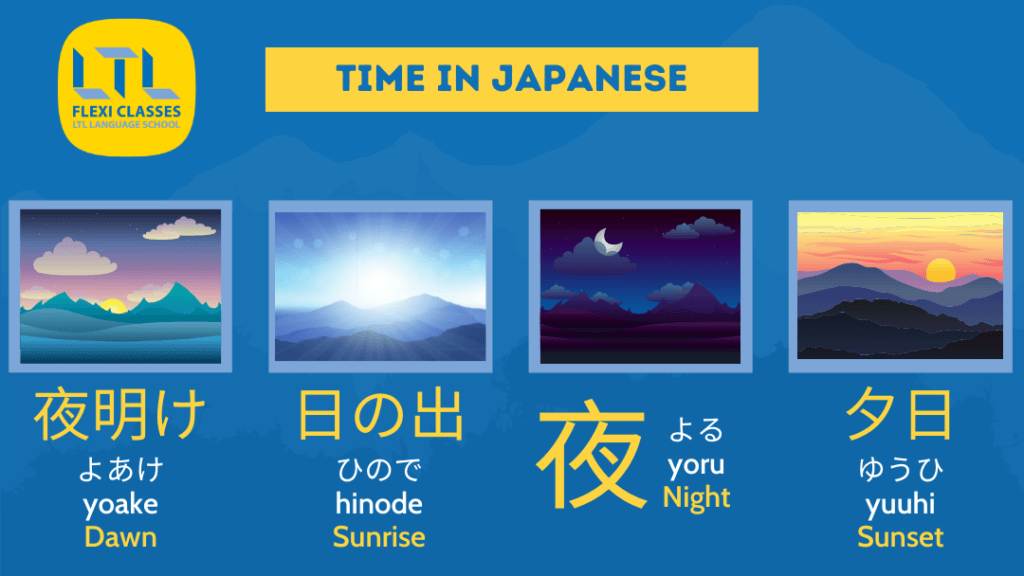
Time in Japanese | Days of the Week in Japanese
Japanese days of the week all end in youbi so that’s the first thing you’ll want to remember!
| Japanese | Kanji | English |
|---|---|---|
| getsu yôbi | 月曜日 | Monday |
| ka yôbi | 火曜日 | Tuesday |
| sui yôbi | 水曜日 | Wednesday |
| moku yôbi | 木曜日 | Thursday |
| kin yôbi | 金曜日 | Friday |
| do yôbi | 土曜日 | Saturday |
| nichi yôbi | 日曜日 | Sunday |
The days of the week in Japanese actually have an interesting origin.
The days of the week are named after the seven celestial bodies of our solar system known in Antiquity.
- The Sun
- The Moon
- The Planets (Mars, Mercury, Jupiter, Venus and Saturn)
Can you guess which is named after the Sun?
Not too difficult right? SUNDAY.
日 means Sun in Japanese so 日曜日 (nichi yôbi) is Sunday.
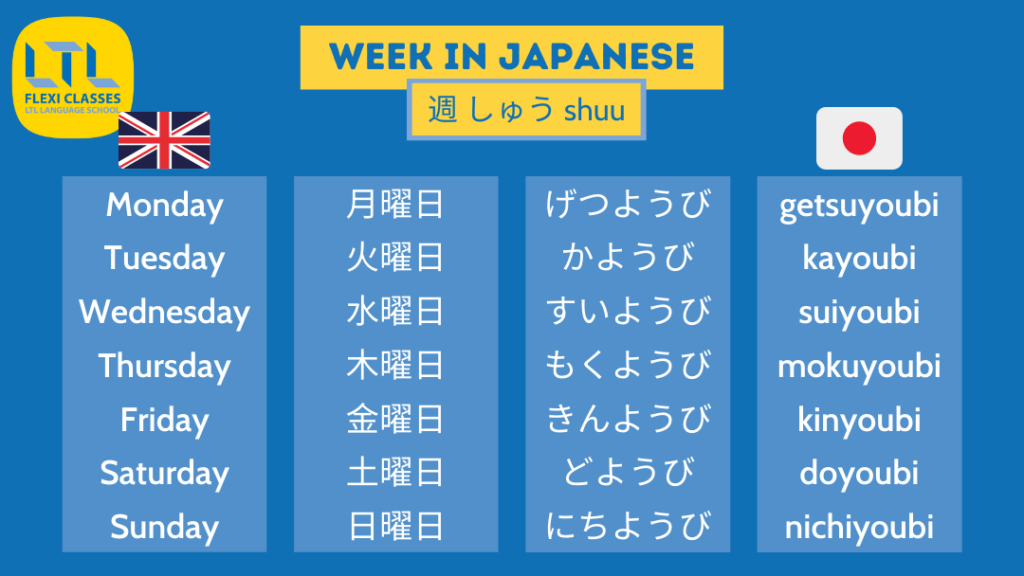
Time in Japanese | Other Vocabulary Related To Days
We now know the days of the week in Japanese but what about if we want to use words like:
- Yesterday
- Today
- Tomorrow
Let’s run you through some more key words in Japanese you’ll be using everyday!
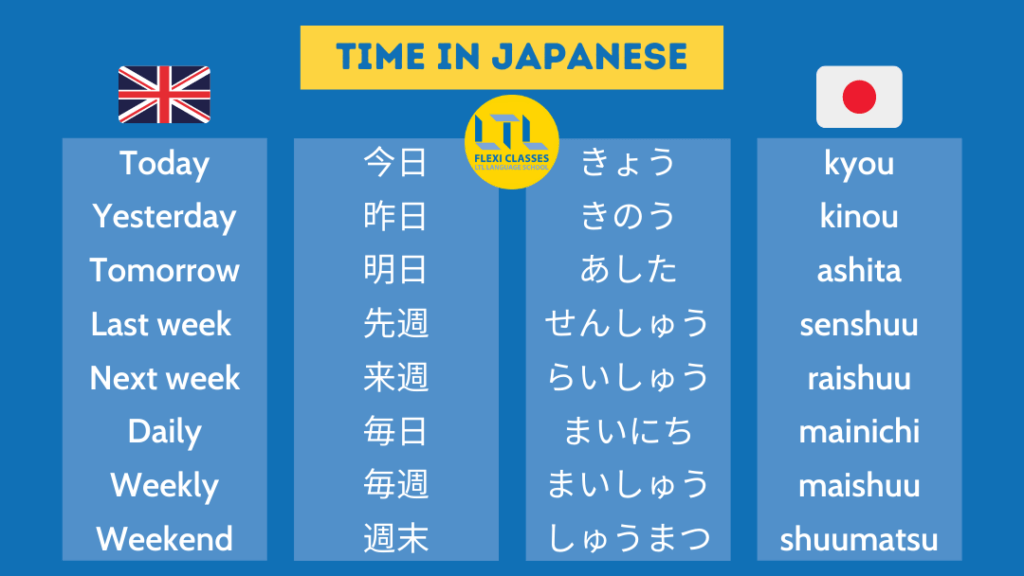
If you are a learner of Mandarin, you’ll notice a lot of the Kanji crossover with the Hanzi in Mandarin.
Although these look the same do be aware they are spoken completely differently.
You’ll also notice with Japanese that Kanji can have more than one pronunciation. You would indeed be correct.
This is because every Kanji has to different pronunciations, these are called on’yomi and kun’yomi.
That’s a lesson for another day though!
BONUS BLOGS
Learn the Days, Weeks and Months in Mandarin
Discover why Kanji & Hanzi aren’t always as similar as they seem

Hanzi vs Kanji // Japanese Kanji NOT To Use in Chinese
Hanzi vs Kanji // Japanese and Chinese have a long history of sharing characters with each other, but it’s not always as simple as that. Find out why…
Time in Japanese // Months in Japanese
Learning the months in Japanese is a piece of cake!
Once again, it boils down to the numbers. If you know 1-12 in Japanese, then you’re already half way there.
To complete the months, we just need to add the word 月 gatsu.
Can you guess what January and March are in Japanese?
As January and March are the 1st and 3rd months they are spoken as:
- January | 一月 (ichi-gatsu)
- March | 三月 (san-gatsu)
It could not be easier, right?! Simply the number of the month followed by 月!
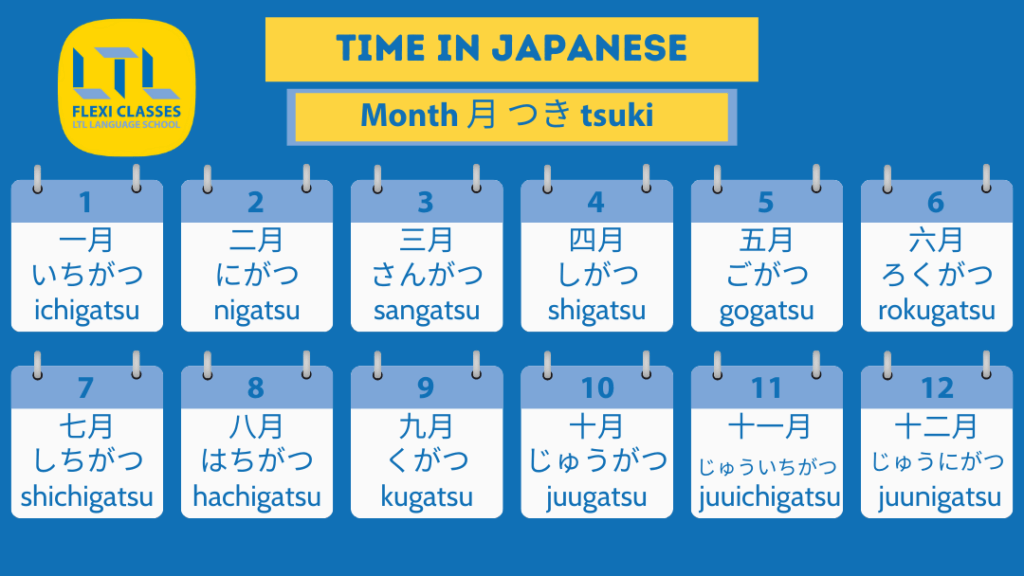
Our friend Layla shows us how it’s done:
Time in Japanese // Seasons in Japanese
A question we often get asked is what’s our favourite season and why.
Therefore we thought we’d finish today’s lesson by teaching you the four seasons in Japanese.
Once again, you’ll notice a crossover with the Mandarin and Japanese written script if you study Chinese too!
| Kanji | Hiragana | Reading | English |
|---|---|---|---|
| 春 | はる | haru | Spring |
| 夏 | なつ | natsu | Summer |
| 秋 | あき | aki | Autumn |
| 冬 | ふゆ | huyu | Winter |
| 季节 | きせつ | kisetsu | Season |
| 四季 | しき | shiki | The four seasons |
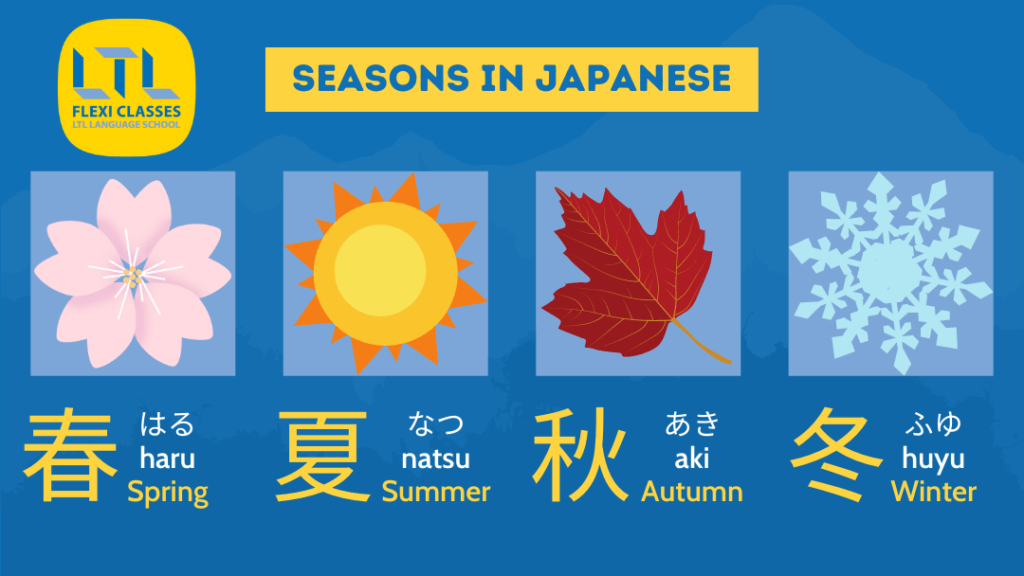
Time in Japanese // FREE QUIZ
So that’s all you need to know about the minutes, hours, days, months and everything related to time in Japanese.
Now it’s time to see how much you remembered!
We have prepared a quick-fire 20 question quiz. The results are instant and it’s great practice.
If you scored well, why not comment below with your final score!
Time in Japanese // FAQ’s
How do you say what’s the time in Japanese?
What is the time in Japanese is 今何时ですか (ima nanji desu ka)
How do you tell the time in Japanese?
It’s super easy once you know the numbers.
To tell them time we simply need to attach 時 (ji) to the number and your job is done!
3 o’clock | 三時 (san-ji)
7 o’clock | 七時 (shichi-ji)
9 o’clock | 九時 (ku-ji)
How do you say Sunday in Japanese?
Sunday in Japanese is 日曜日 (nichi yôbi).
How do you learn the months in Japanese?
Learning the months in Japanese is a piece of cake!
Once again, it boils down to the numbers. If you know 1-12 in Japanese, then you’re already half way there.
To complete the months, we just need to add the word 月 gatsu.
Can you guess what January and March are in Japanese?
As January and March are the 1st and 3rd months they are spoken as:
January | 一月 (ichi-gatsu)
March | 三月 (san-gatsu)
It could not be easier, right?! Simply the number of the month followed by 月!
How do you say Summer in Japanese?
Summer in Japanese is 夏 which is spoken as natsu.
Want More From LTL?
WANT TO LEARN JAPANESE? Check out our online Japanese courses here.
We offer a 7-day free trial to all new students where you can study 24/7.
What about studying Japanese in Japan instead? We’ve got your back. Our Japanese courses in Tokyo can either be taken in small groups of no more than 5 students or individually for a more tailored experience.
We even offer incredible homestay experiences in Tokyo as well.
Come and be a part of this amazing community.











4 comments
时间 is the same as Chinese (in traditional form)
You are absolutely correct!
Great site. Lots of helpful information here.
Thanks Elma!